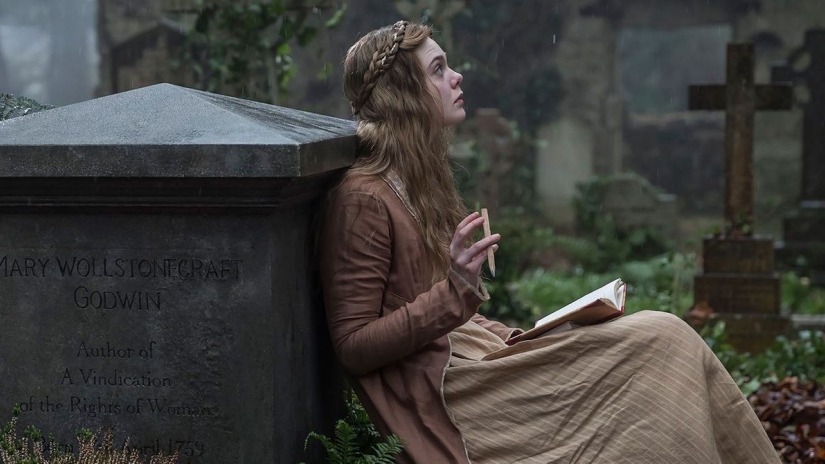Director Haifaa al-Mansour’s Mary Shelley traces the life of Mary Wollstonecraft Godwin (Elle Fanning), the daughter of William Godwin (Stephen Dillane) and Mary Wollstonecraft, through her relationship and eventual marriage to the poet Percy Shelley (Douglas Booth) and her writing of Frankenstein. The romance is the central focus of a film that attempts to spin out the Mary/Percy relationship into a parallel between Frankenstein and his Creature, highlighting Mary’s close-knit relationship to death and resurrection that is refracted throughout her life.
Mary Shelley’s life is ripe for a biopic—there’s a wealth of real-life melodrama from which to draw. Her mother was a passionate free thinker and advocate for women’s rights, her father an influential publisher and intellectual. Mary fell in love at a young age with a renowned Romantic poet (also already married), who eventually become an alcoholic and laudanum addict. Frankenstein was considered so outlandish that many balked at the idea that a seventeen-year-old girl could have possibly written so grotesque, so horrifying, and so philosophically complex a novel. Mary Shelley is credited with inventing science fiction, as a pioneer in literary horror; a young woman who knew, loved, and debated some of the greatest poetic minds of the day.
So it is a profound disappointment that Mary Shelley reduces such a fascinating figure to a somewhat silly romantic girl. Fanning acquits herself decently with the material that she’s given, but the film reduces its central character down to a teenage girl who worships her loser boyfriend, right up until she doesn’t. The struggle that Mary had to get her work published, the fact that Percy Shelley was initially credited with the novel, Mary’s own ambitions as the daughter of two famous writers, all come in late in the film, almost as footnotes in a story about banal teenage melodrama.
Douglas Booth’s Percy Bysshe Shelley (for some reason he feels the need to introduce himself like that) is even less interesting than the woman he seduces. If he’s a genius, as many of the characters reiterate, we never see it. The one time that Percy performs a full poem, one wonders if the film is trying to tell us that the Romantics just weren’t very good poets. The rest of his literary output, and the influence that Mary had on it, becomes secondary to his supposed hedonism, which is really just drinking a lot and occasionally shouting at his girlfriend. This is not a great poet-philosopher, but a little boy pretending to be a man.
Then there’s Tom Sturridge, turning in a performance as the least attractive version of Lord Byron ever to ooze his way onto the screen. Sturridge’s Byron is so phenomenally off-putting that one struggles to understand why anyone – much less literally dozens of young women and men – would give Byron a second glance. He’s also a footnote in the script, primarily there because he has to be in order for the plot to move forward. We need to get Mary and Percy to that castle in Geneva, so that she can write her great novel. But there is not a single glimpse of intellect or poetic brilliance in Byron, or Shelley, or even Mary herself.

Truly, this is a universe that posits that Romantic poets as children making grand pronouncements about life and death and love without the talent to back it up. Which might be an interesting argument—one that more than a few English scholars have made. But the film equally demands that we recognize the brilliance of Shelley, Byron, and Mary Godwin, while at the same time failing to showcase their abilities. Byron screams choppy lines of poetry, waving a bottle about; Coleridge is dismissed in a few insulting lines. Mary’s writing of Frankenstein comes about in a fever of composition, glossed over with the occasional buzzword about “freedom of ideals,” bad dreams about dead children, and gazing lovingly at a portrait of her mother.
Frankenstein is supposedly about Mary, in some way, and her relationship to Percy Shelley, but this parallel is never fully explored (possibly because even the film knows it’s a very questionable interpretation to hang one’s entire plot on). Though we might have seen a Mary Shelley chafing under the restrictions of the society, desperate to discover freedom and informed by her mother’s philosophy and the culture changing around her, instead we have a teenage girl sucked in by a not very talented boy who gives her some guff about “free love.” Mary’s suffering, supposed to eventually inform the suffering of Frankenstein’s Creature, is hardly tempered by any grander ideals or philosophical understanding. There is no philosophy here at all, no moral or intellectual complexity; not even a hint of why Mary would seek to live a “different” life outside of the cultural mores of her society.
Visually, Mary Shelley attempts, at times successfully, to find the Gothic tinges in the English and Scottish landscapes and depict the wildness of the storm in Geneva that eventually spawns Frankenstein. But those images are never sustained and seem more like stage settings than a real world. There is no sense of reality in the depiction of late 18th and early 19th Century Britain, no elucidation of the society in which these people live and which they rebel against. The stagnation of British society, the strictures on women, the aftermath of revolution in France, the political and cultural repercussions of the Enlightenment—all of which drove the Romantics at a philosophical and political level—are almost entirely ignored. This is a CW version of 19th Century Britain, more interested in mediocre aesthetics than in any real exploration of these characters or their age.
Frankenstein is the product of a deeply thoughtful and mature mind – a teenage girl who is probably smarter than the men around her, introspective, clever, and of surpassing complexity. Mary Shelley is not the woman who wrote that book. She deserves so much better.
Mary Shelley is currently showing at the Tribeca Film Festival.

